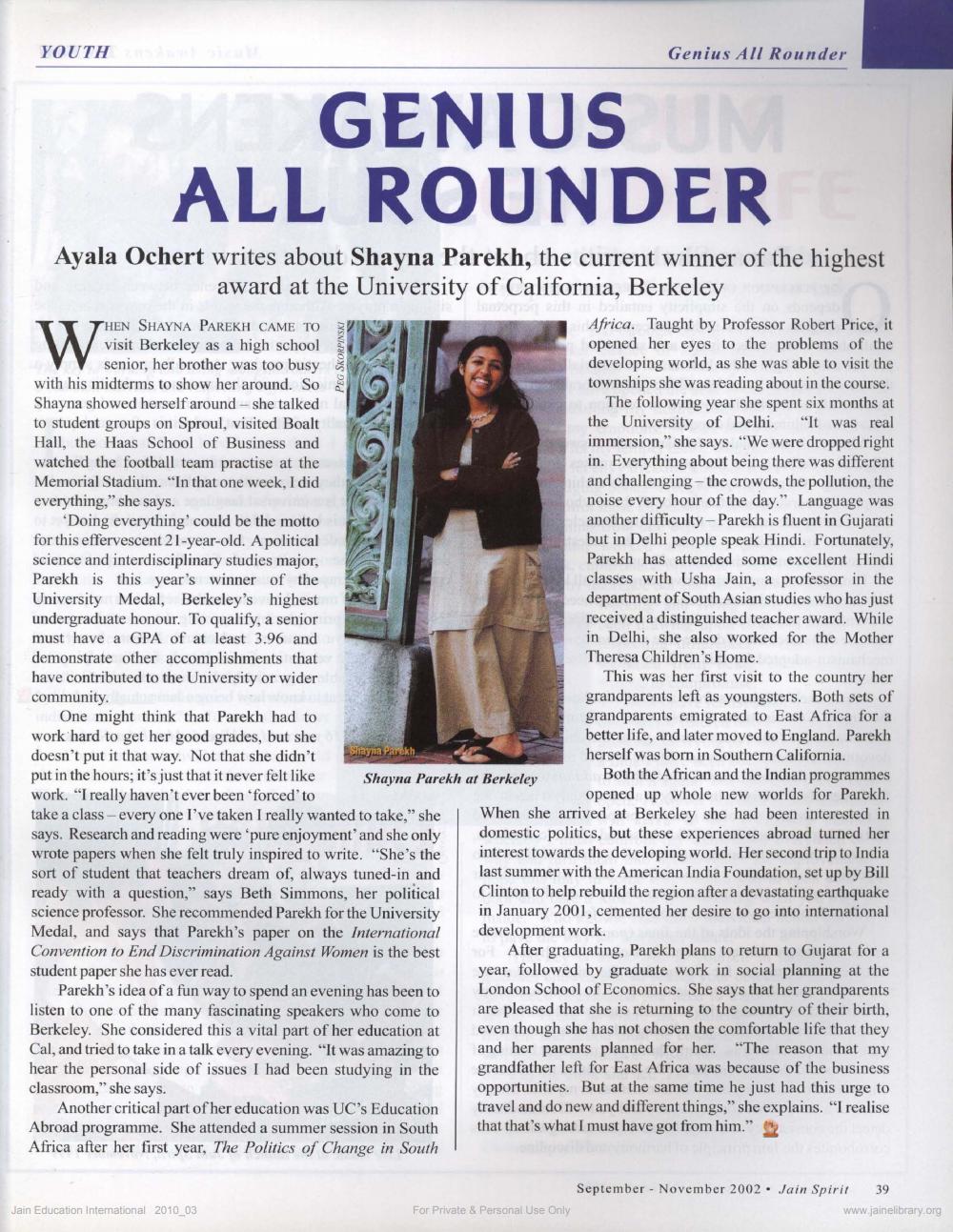________________
YOUTH
13
GENIUSZUM ALL ROUNDERFE
Ayala Ochert writes about Shayna Parekh, the current winner of the highest award at the University of California, Berkeley
langs sidha
W
THEN SHAYNA PAREKH CAME TO visit Berkeley as a high school senior, her brother was too busy with his midterms to show her around. So Shayna showed herself around - she talked to student groups on Sproul, visited Boalt Hall, the Haas School of Business and watched the football team practise at the Memorial Stadium. "In that one week, I did everything," she says.
Doing everything' could be the motto for this effervescent 21-year-old. A political science and interdisciplinary studies major, Parekh is this year's winner of the University Medal, Berkeley's highest undergraduate honour. To qualify, a senior must have a GPA of at least 3.96 and demonstrate other accomplishments that have contributed to the University or wider community.
One might think that Parekh had to work hard to get her good grades, but she doesn't put it that way. Not that she didn't put in the hours; it's just that it never felt like work. "I really haven't ever been 'forced' to take a class - every one I've taken I really wanted to take," she says. Research and reading were 'pure enjoyment' and she only wrote papers when she felt truly inspired to write. "She's the sort of student that teachers dream of, always tuned-in and ready with a question," says Beth Simmons, her political science professor. She recommended Parekh for the University Medal, and says that Parekh's paper on the International Convention to End Discrimination Against Women is the best student paper she has ever read.
Parekh's idea of a fun way to spend an evening has been to listen to one of the many fascinating speakers who come to Berkeley. She considered this a vital part of her education at Cal, and tried to take in a talk every evening. "It was amazing to hear the personal side of issues I had been studying in the classroom," she says.
Shayna Parekh
Shayna Parekh at Berkeley
Another critical part of her education was UC's Education Abroad programme. She attended a summer session in South Africa after her first year, The Politics of Change in South
Jain Education International 2010_03
Genius All Rounder
Africa. Taught by Professor Robert Price, it opened her eyes to the problems of the developing world, as she was able to visit the townships she was reading about in the course.
For Private & Personal Use Only
The following year she spent six months at the University of Delhi. "It was real immersion," she says. "We were dropped right in. Everything about being there was different and challenging the crowds, the pollution, the noise every hour of the day." Language was another difficulty-Parekh is fluent in Gujarati but in Delhi people speak Hindi. Fortunately, Parekh has attended some excellent Hindi classes with Usha Jain, a professor in the department of South Asian studies who has just received a distinguished teacher award. While in Delhi, she also worked for the Mother Theresa Children's Home.
This was her first visit to the country her grandparents left as youngsters. Both sets of grandparents emigrated to East Africa for a better life, and later moved to England. Parekh herself was born in Southern California.
Both the African and the Indian programmes opened up whole new worlds for Parekh. When she arrived at Berkeley she had been interested in domestic politics, but these experiences abroad turned her interest towards the developing world. Her second trip to India last summer with the American India Foundation, set up by Bill Clinton to help rebuild the region after a devastating earthquake in January 2001, cemented her desire to go into international development work.
After graduating, Parekh plans to return to Gujarat for a year, followed by graduate work in social planning at the London School of Economics. She says that her grandparents are pleased that she is returning to the country of their birth, even though she has not chosen the comfortable life that they and her parents planned for her. "The reason that my grandfather left for East Africa was because of the business opportunities. But at the same time he just had this urge to travel and do new and different things," she explains. "I realise that that's what I must have got from him."
September November 2002 Jain Spirit
39 www.jainelibrary.org




